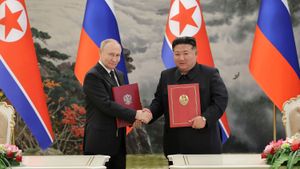European Central Bank (ECB) President Christine Lagarde has continued to express concerns over the economic ramifications of rising global trade tensions and the need for enhanced economic integration within the continent. Speaking at the ECB’s recent events, she highlighted the urgency required to navigate the complications presented by geopolitical shifts, particularly those stemming from increasing competition with the United States. Lagarde’s statements come at a time when the ECB is preparing for potential changes to interest rates, potentially aimed at countering economic headwinds intensified by these trade issues.
During her address, Lagarde emphasized the detrimental impact of these trade tensions on the eurozone, which has emerged as economically vulnerable due to both external pressures and internal challenges. The President noted, "The geopolitical environment has also become less favorable, with growing threats to free trade from all corners of the world." This sentiment echoes concerns raised by various economic analysts and policymakers who have been observing how tariffs and trade disputes can spiral quickly, impacting economic growth and inflations.
Lagarde pointed out the stark reality for European households, which currently hold around €11.5 trillion ($12.5 trillion) in cash and deposits. This substantial reserve not only demonstrates the economic cautiousness among consumers but also indicates a significant amount of capital remaining uninvested. She mentioned, "If EU households were to align their deposit-to-financial assets ratio with US households, up to €8 trillion could be redirected toward long-term, market-based investments — or around €350 billion annually." This potential redirection of funds could provide much-needed stimulus for European businesses.
The ECB President's call for greater integration among EU capital markets reflects her recognition of how national interests often hinder collective economic actions. She suggested creating an EU-wide regulatory framework on top of the current national regulations to facilitate smoother access to capital markets. Such steps might enable more efficient capital flow within the EU, making it less likely for financial resources to seek returns outside the European borders.
Shifting gears to the anticipated interest rate reductions, ECB Vice President Luis de Guindos remarked, "The question of whether we cut 50 or 25 basis points is much less important," underscoring the focus on the overall direction of monetary policy rather than the specific size of rate cuts. This approach is rooted in the ECB’s desire to maintain economic-stability and growth, but Guindos did caution against rushing decisions, especially with trade tensions looming on the horizon.
Guindos, reflecting on the potential outcomes of President-elect Donald Trump’s proposed tariffs, warned of the snowball effect tariffs could have, potentially sparking retaliatory measures from affected countries. He noted, "If you put a 60% tariff on Chinese products... it will lead to diverted trade flows to other jurisdictions." This presents the risk of falling back on the negative historical precedents of trade wars, which, as he stated, could induce stagnation and inflationary pressures within the European market as uncertainty continues to plague various sectors.
Lagarde's comments highlight the broader fear among European policymakers and economists about the impending 'vicious circle of trade war' dynamics, where countries feel pressured to respond to tariffs with their own hikes, mirroring Guindos’ predictions. The overarching message centers on the necessity for preparedness and resilience amid shifting global relationships and the uncertainties associated with international trade.
Data released recently has shown signs of strain within the eurozone’s leading economies. This decline compels the ECB to contemplate its course of action carefully. The availability of credit remains tenuous, especially for start-ups and innovative enterprises, as Lagarde acknowledged. She insists Europe must facilitate investment flows to nurture growth sectors, including venture capital, which have historically struggled to gain traction compared to their counterparts across the Atlantic.
The ECB’s potential rate cuts come alongside diminishing expectations for inflation, placing additional pressure on the institution to act strategically to bolster confidence within both businesses and consumers. Guindos added, "Wage growth will slow next year," reinforcing the notion of challenges lurking on the horizon.
Overall, the emphasis on economic integration, accessible capital markets, and strategic monetary policy highlights the steps European leadership may need to take amid environmental uncertainties and pressures. The delicate balancing act between pursuing collective interests and national priorities will remain front and center as the Eurozone navigates through these tumultuous times.



